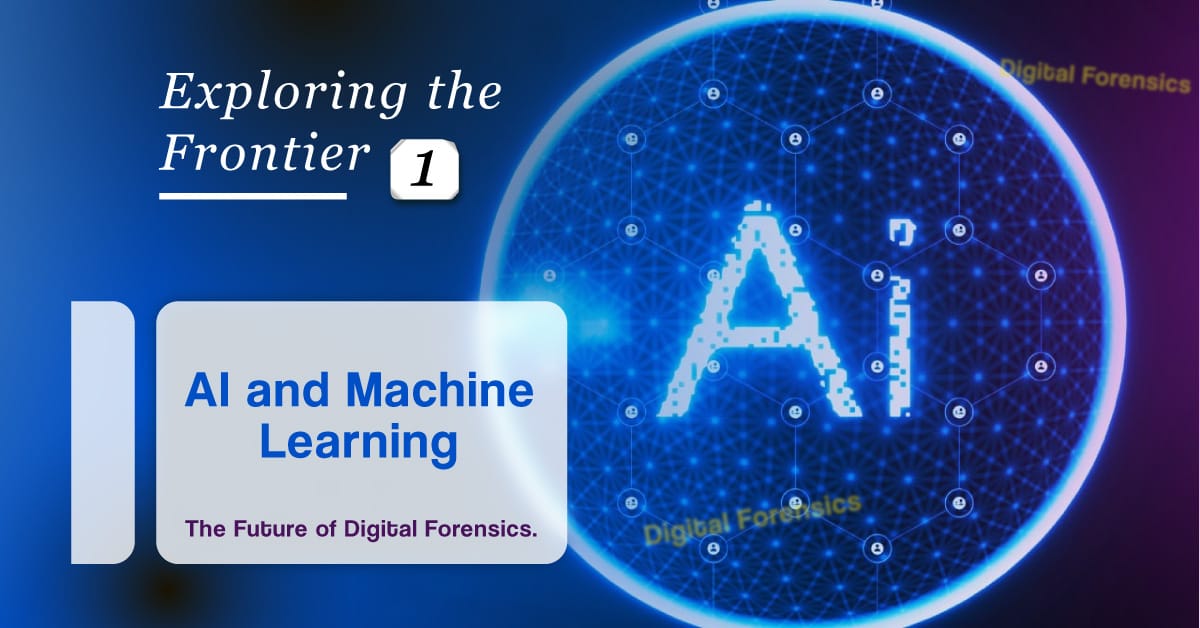Contributor: C. Gene McClain, CFCE, CCLO, CCPA, MCFE, Director of Forensic Operations
In the rapidly evolving field of digital forensics, AI and Machine Learning are at the forefront of innovation, transforming how forensic experts approach and solve complex cases. In our new 10-part series, we delve into the hottest topics in digital forensics for 2024, starting with the groundbreaking role of AI and Machine Learning.
AI and Machine Learning
AI algorithms are revolutionizing digital forensics by enabling faster and more accurate analysis of large datasets. These advanced technologies are adept at identifying patterns and anomalies that may go unnoticed by human examiners, significantly enhancing the efficiency and effectiveness of forensic investigations.
Enhanced Data Analysis
AI and Machine Learning models excel at processing vast amounts of data swiftly and accurately. They can analyze multiple data points simultaneously, identifying critical patterns and connections that would take human analysts significantly more time to discern. This capability is particularly valuable in digital forensics, where timely and precise data analysis can make a substantial difference in the outcome of investigations.
For example, AI can quickly sift through vast amounts of digital evidence, such as emails, social media posts, and digital transactions, to identify pertinent information. This speed and efficiency are crucial in cases involving large-scale cybercrime, where time is often of the essence.
Pattern Recognition and Anomaly Detection
One of AI’s key strengths in digital forensics is its ability to recognize patterns and detect anomalies. Machine Learning models can be trained to recognize normal behavior within a dataset, making it easier to spot irregular activities that might indicate fraudulent behavior or security breaches. This functionality is essential in identifying sophisticated cyber threats that might otherwise go undetected.
For instance, in financial fraud investigations, AI can detect unusual transaction patterns that deviate from a person’s typical behavior, flagging potential fraud cases for further investigation. This proactive approach allows forensic experts to act swiftly and prevent further damage.
Automating Repetitive Tasks
AI can automate many of the repetitive tasks involved in digital forensics, such as data collection and initial analysis. By handling these tasks, AI allows forensic experts to focus on more complex aspects of their investigations, improving overall productivity and accuracy.
Automating tasks like sorting through logs or extracting metadata from files not only speeds up the process but also reduces the risk of human error. This ensures that forensic investigators can concentrate on critical thinking and analysis, making the investigation process more efficient.
Improved Accuracy and Precision
The precision of AI algorithms reduces the likelihood of human error in data analysis. By providing consistent and unbiased results, AI enhances the reliability of forensic findings, ensuring that investigations are based on accurate and dependable data.
AI’s ability to cross-reference data from various sources and validate findings through multiple checks adds a layer of accuracy that manual methods may lack. This thoroughness is particularly beneficial in legal contexts, where the integrity of forensic evidence is paramount.
Future Implications
As AI and Machine Learning continue to evolve, their impact on digital forensics will only grow. Future advancements may include more sophisticated AI models capable of understanding and interpreting even more complex datasets, further enhancing the capabilities of forensic investigators.
Emerging technologies such as deep learning and neural networks could enable AI systems to understand and analyze unstructured data, such as video footage and audio recordings, with unprecedented accuracy. This would open new avenues for solving crimes and uncovering crucial evidence that would be difficult to process manually.
Stay tuned as we explore more cutting-edge topics in our series, including Cloud Forensics, IoT Forensics, and more, to keep you updated on the latest trends and innovations shaping the future of digital forensics.
For more insights and detailed analysis, please read our full article: Top 10 Hottest Topics in Digital Forensics for 2024







